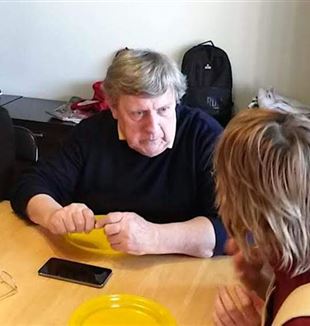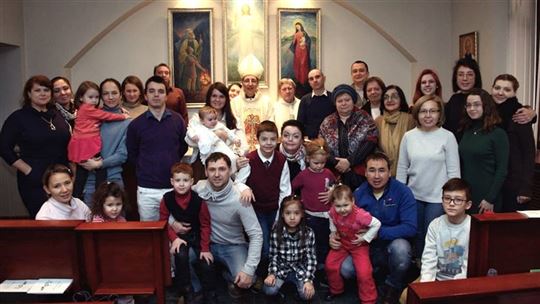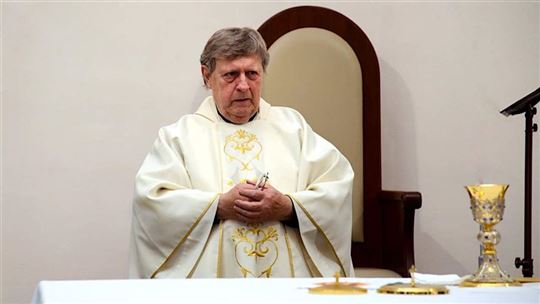
Fr. Livio: Back from Almaty
He spent twenty-three years in Kazakhstan as a missionary. Now he is back in Cremona, and re-evaluates everything he lived. Friends, encounters, works. Without regrets, but eager to discover what this path still has in store for him.After 23 years of mission in Kazakhstan, Fr. Livio Lodigiani has returned definitively to Italy. A priest from Cremona who was "lent" to Asia, he has no regrets or sadness. Only a great desire to discover what the good Lord will reserve for him now, at almost 70 years of age.
It all began one evening 26 years ago, when a small group of priests - very close friends - met in Milan. It was customary among them to have a moment of free discussion, without any fuss. They came from different dioceses and parishes scattered throughout Lombardy to eat together and "tell each other about their lives". This time, however, they listened. In fact, Polish Archbishop Pawel Lenga, stationed in Kazakhstan, a country with a strong Muslim presence and semi-unknown, which was struggling to emerge from Soviet influence, was invited to dinner. Monsignor Lenga came to Italy to ask the bishops to send some fidei donum priests to Asia, where the collapse of the Soviet Union had left everything full of rubble, with a whole humanity to rebuild. And what else could they do if not bear witness to the Gospel there too? Among those present was Fr. Livio Lodigiani: "I listened in silence to that Bishop who told us about his missionary life in Kazakhstan and who explicitly told us that he needed a hand. For me, it was like a flash of lightning: as a priest, I had never excluded the possibility of mission, but it had never been my obsession. That evening, however, everyone present felt called. So I made myself available: I was so certain of the companionship around me that I could go to the end of the world. Each of us, in the following days, had to reckon with our family situation, our health and the agreement of our bishop, because we were all diocesan priests. In the end, six of us left".
In the space of three or four years Fr. Edo Canetta, Fr. Massimo Ungari, Fr. Livio, Fr. Eugenio Nembrini, Fr. Adelio Dell'Oro and Fr. Giuseppe Venturini all flew to Kazakhstan. The first "landing place" was Karaganda, a very cold city founded in the early twentieth century by prisoners of the Soviet gulag.
"A few months later, at the explicit invitation of the Apostolic Nuncio, Fr. Massimo and I moved to the capital Almaty, to support a Franciscan parish. We found a small apartment next to the church, where we said mass every morning, and then we began to teach Italian in the universities. There was, at the time, a great "hunger" to learn the Italian language among young Kazakhs. We did not understand why they loved it so much, but everyone told us that they were impressed by the culture, history, beauty, song and art of our country. It was the years after the Soviet collapse, there was a lack of money for bread, for the bus, factories were closed and door and window frames were burnt to make fire because coal was too expensive... But these poor people were fascinated by beauty".
In the University, in Almaty, the two priests began to meet students, to spend time with them. A small group of friends took form, who were joined by some young people who had met Fr. Edo and Fr. Eugenio in Karaganda and who had moved to the capital to find work. Issyk, Janashar, Basargheldy, Turghen... These are the names of some of the villages and towns that made up their two parishes. "The majority were Kazakhs and Muslims, then there were also Orthodox Russians and, to a lesser extent, Germans, Poles, Ukrainians, Koreans and many other nationalities. Many of them were "children or grandchildren of Soviet deportations", descendants of people who had suffered incredible harassment and hardship and who now, as then, face the toil of living with dignity".
Livio taught Italian, Fr. Massimo soon moved to work in the Nunciature and his friendship with the Nuncio became a great point of support for them: "When they moved the capital from Almaty to Astana, he asked us to open another house. No one at the time would have bet a penny that Astana would become the "capital", it was thought to be a poor and inadequate place. But he sensed that a Christian presence and friendship could not lack there as well. The relationship with him was fundamental, a great help, a friendship in obedience".
Meanwhile, in Almaty, encounters multiplied with enormous simplicity, without any "proselytizing program", no projects or calculations. "In addition to lessons, we organized basketball and volleyball games once a week with the kids. Within this simple thing, I do not know how and I do not know why, but certainly without having planned it, the young people became attached. They invited their friends, or someone would appear asking, "Can I join your companionship?" They were full of questions, eager to understand. We were simply ourselves: Italians, ironic, friends among us. One time, a friend of ours from Kazakhstan, who now lives in Italy, told us: "You all seem a bit crazy to me, but you live a unity that I like. You say that it has to do with Jesus Christ, of whom I do not give a damn because I am an atheist. But if you tell me that you are like that because you have met Christ, then I am interested in knowing Him"".
The companionship grows, but the Nuncio's request awaited an answer and so the priests decide to accept. It was the beginning of the 2000s. Fr. Eugenio and Fr. Massimo were in Almaty, Fr. Giuseppe Venturini and Fr. Adelio were in Karaganda (today he is Bishop of the city) and Fr. Livio and Fr. Edo were in Astana. Despite the considerable distance, with thousands of kilometers between one city and another, the six friends did not lose sight of each other. Once a month - "there is no ice can hold” – they tried to get together for dinner, to tell each other about the great things that were happening and to help each other financially. Almaty, in fact, was a city richer than Karaganda and it is not uncommon to have to send lamps, heaters and other basic necessities.
"We supported each other by reminding ourselves of the reasons for our presence in that distant land. In fact, the young people challenged us: "Here, we dream of going to Italy, and you come to our country that is in such a bad shape. Why?" This question did not leave us alone, it awakened in us the desire to understand what we were called to do in that place, day after day. I must say that, when it was cold or in moments of difficulty, we too questioned it. It was clear that compared to the need that there was, we were like ants. But there we were. And what I sensed - and what I tried to sketch out for them as an answer - was that in Italy I had lived a Christian companionship and a life that was so beautiful and intense that when there was the possibility of sharing it with others, without thinking twice, I said: "I am going".
Then things matured. Some young people began to ask for baptism, the sacraments and, sometimes, even marriage. "We had never explicitly told them about these things. In addition to study and games, we invited them to School of Community and, for those who wanted, to Mass. That was it. The great thing was to see the path of these people in which a radical and definitive desire was awakened. It was not the result of our strategy: everything happened because the Lord let it happen and because they said yes. I remember a phrase by Fr. Giussani about the first Kazakhs who met him at the Sacro Cuore: "They have a pure religious sense". It was enough for him to spend a few hours with them to sense the freshness of life they brought". The fruits? Today, when the summer holidays of the movement are in Kazakhstan, about a hundred of them come together in Almaty.
READ ALSO - Brazil: who has begotten the drops of dew?
A few weeks ago, Fr. Livio returned to Italy, to Cremona. In Almaty, there is no longer a priest of the movement. "There is a question that, coming away, tormented me, regarding all the people I have met there in these years: 'And now, who will be there for them? What will become of them?’ In particular, I was thinking of a nine-year-old orphan child, Nikita, whom I met in the house of the Sisters of Mother Teresa. He did not talk, he just made animal noises. But at Mass he made a big racket, so one day I said to him, ‘Will you help me as an altar boy?’ He was the best altar boy I have ever had. From then, a friendship was born, because he began to attend the Center (a place of support for disabled or troubled children founded by the missionaries of the movement) and slowly began to speak. A true miracle! I thought about him as I was leaving, and about the group of friends with whom I was having lunch once a week. An incredible story, eh... We became friends through helping at the Centre. It almost sounded like a joke: an Italian priest, a French cook, a Kazakh girl, an American... A sign of the cross before starting; those lunches were never trivial. They were the place where to ask questions, to meet the desire to understand more about the Christian experience we were living. When I left, I wondered what would become of them, but then I said to myself: ‘Do not be stupid, Livio: it is not you who changed them, you are the instrument. If the Lord has led them this far, He will lead them on’. This companionship was born from Him. They belong to the Lord and what I have seen is not the development of a project of mine, but the path in which Another has put us together. I returned to Cremona happy, with no regrets. Last Friday, I was at the "farmers' dinner", here in Cremona, which they do once a week. Just like lunch with my Kazakh friends. And it was impressive because I saw exactly the same thing: a life. The Lord has shown me what gives continuity to life: the gratuity that goes through everyday life. And so I ask for eyes to see and a heart available to welcome”.#Mission